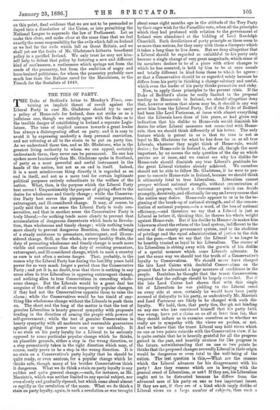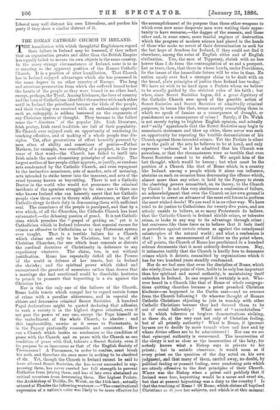THE TIES OF PARTY.
THE Duke of Bedford's letter to Monday's Times, con- taining an implicit threat of revolt against the Liberal Party in case Mr. Gladstone should try to carry a policy of Home-rule for Ireland, does not strike us as a judicious one, though we entirely agree with the Duke as to the terrible danger of establishing in Ireland a separate Legis- lature. The tone of implied menace towards a great leader has always a disintegrating effect on party, and it is easy to avoid it by expressing modestly a deep personal conviction, and not referring at all to the strain to be put on party ties. As we understand these ties, and as Mr. Gladstone, who is the greatest living authority to whom we can appeal, certainly understands them, they never can be paramount. No one has spoken more luminously than Mr. Gladstone spoke in Scotland, of party as a most powerful and useful instrument in the hands of the nation, but not as an end in itself. Indeed, it is a most mischievous thing directly it is regarded as an end in itself, and not as a mere tool for certain legitimate political purposes entirely subordinate to the welfare of the nation. What, then, is the purpose which the Liberal Party best serves ? Unquestionably the purpose of giving effect to the desire for wholesome and timely change ; while the Conserva- tive Party best serves the purpose of resisting premature, extravagant, and ill-considered change. It may, of course, be justly said that in one sense the Liberal Party is truly con- servative, and that in another sense the Conservative Party is truly liberal,—for nothing tends more clearly to prevent that accumulation of dangerous discontents which leads to Revolu- tion, than wholesome and timely change ; while nothing tends more clearly to prevent dangerous Reaction, than the offering of a steady resistance to premature, extravagant, and ill-con- sidered change. Still, on the whole, in every healthy State, the duty of promoting wholesome and timely change is much more visible and continuous than the duty of resisting premature, extravagant, and ill-considered change, which in such a country as ours is not often a serious danger. That, probably, is the reason why the Liberal Party has during the last fifty years held power for so very much longer a period than the Conservative Party ; and yet it is, no doubt, true that there is nothing in any sense alien to true Liberalism in opposing extravagant change, and nothing alien to true Conservatism in conceding whole- some change. But the Liberals would be a great deal too sanguine of the effect of all even temporarily popular changes, if they had not the Conservatives opposite them to raise the alarm ; while the Conservatives would be too timid of any- thing like wholesome change without the Liberals to push them on. The short and the long of the matter is that the test of genuine Liberalism is hearty general sympathy with proposals tending in the direction of arming the people with powers of self-government ; while the teat of genuine Conservatism is hearty sympathy with all moderate and reasonable guarantees against giving that power too soon or too suddenly. It is no stain on his party loyalty for a Liberal to be seriously opposed to some particular popular change which he thinks, on plausible grounds, either a step in the wrong direction, or a step prematurely taken in the right direction which may, of course, easily prove to be a step in the wrong direction. It is no stain on a Conservative's party loyalty that he should be quite ready, or even anxious, for a popular change which he thinks safe, though many of his brother Conservatives think it dangerous. What we do think a stain on party loyalty is any sudden and quite general change,—such, for instance, as Mr. Marriott's, which was neither limited to any special subject, nor even slowly and gradually ripened, but which came about almost as rapidly as the revolution of the moon. What we do think a stain on party loyalty, again, is such a revolution as was brought
about some eight months ago in the attitude of the Tory Party by their eager wish for the Parnellite vote, when all the principles which they had professed with relation to the government of Ireland were abandoned at the bidding of Lord Randolph Churchill. Such derelictions of party principle as these seem to us more than serious, for they carry with them a disrepute which it takes a long time to live down. But we deny altogether that a Liberal should be regarded as unfaithful to his party only because a single change of very great magnitude, which some of its members declare to be of a piece with other changes to which he has assented, is held by him to be at once unsafe and totally different in kind from those to which he agrees ; or that a Conservative should be so regarded solely because he differs from his party in thinking a change salutary and useful, which even the leader of his party thinks premature and risky.
Now, to apply these principles to the present crisis. If the Duke of Bedford's alarm be really limited to the proposal tending to Home-rule in Ireland, we should altogether deny that, however serious that alarm may be, it should in any way sever him from the Liberal Party. But if the Duke of Bedford had been like Lord Fortescue, at issue with almost everything that the Liberals have done of late years, or had given any indication that his dislike to Home-rule would diminish his desire for other Liberal measures not connected with Home- rule, then we should think differently of his letter. The only feature which is patent to us is that its tone is not as loyal to Mr. Gladstone for what he has done for us, as all true Liberals, whatever they might think of Home-rule, would desire ; for Home-rule in Ireland is, after all, though the most important, by no means the only question of the day on which parties are at issue, and we cannot see why his dislike for Home-rule should diminish any true Liberal's gratitude for the great Liberal victories already achieved. We ourselves should not be able to follow Mr. Gladstone, if he were to pro- pose to concede Home-rule in Ireland, because we should think it ultimately fatal to true Liberalism. Liberalism cannot prosper without national strength, without concentration of national purpose, without a Government which can decide promptly, decisively, and effectually for any and every course that the nation may desire. Home-rule appears to us to be the be- ginning of the break-up of national strength, and of the concen- tration of national purpose,—in a word, of the loss of national efficiency,—and therefore we say that a Liberal is just as Liberal as before if, thinking this, he throws his whole weight against Home-rule. But if his dislike to Home-rule makes him lukewarm about the reform of the land system, indifferent to the reform of the county government system, cool to the abolition of privilege and the equal administration of justice to the rich and the poor,—then we say that the Liberal is no longer to be heartily trusted as loyal to his Liberalism. The essence of his Liberalism is ebbing away with the growth of his dislike of a special measure which some Liberals advocate. In just the same way we should test the truth of a Conservative's loyalty to Conservatism. We should never have charged the late Lord Cairns with doubtful Conservatism on the ground that he advocated a large measure of confidence in the people. Doubtless he thought that the truest Conservatism required that the suffrage should be largely extended. But if the late Lord Cairns had shown that with this single bit of Liberalism he was yielding to the Liberal creed on every side at once, certainly he would have been justly accused of disloyalty to his party, as undoubtedly Mr. Marriott and Lord Fortescue are likely to be charged with such dis- loyalty. We hold, then, that party ties, though not binding on any one who has convinced himself that his party faith was wrong, have yet a claim on us all at least thus far, that they should induce us to examine ourselves as to whether we really are in sympathy with the views we profess, or not. And we believe that the truest Liberal may hold views which on one or two points coincide with the Conservative view, if he is quite certain that he is heartily .grateful for all the progress gained in the past, and heartily anxious for like progress in the future, notwithstanding that on one or two points he thinks that the proposed changes avowedly Liberal in their origin would be dangerous or even fatal to the well-being of the nation. The test question is this,—What are the reasons which the Liberal advances for his disagreement with his party ? Are they reasons which are in keeping with the general creed of Liberalism, or not? If they are, his Liberalism ought not to be distrusted because he differs from the advanced men of his party on one or two important issues. If they are not, if they are of a kind which imply dislike of Liberal views on a large number of subjects, then such a
Liberal may well distrust his own Liberalism, and pardon his party if they show a similar distrust of it.



































 Previous page
Previous page